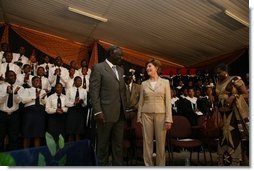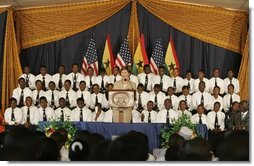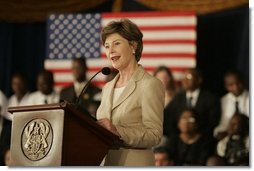|
Home >
News & Policies >
January 2006
|
For Immediate Release
Office of the First Lady
January 17, 2006
Mrs. Bush's Remarks at the Launch of the Africa Education Initiative Textbooks Program
Accra Teacher Training College
Accra, Ghana
8:45 A.M. (Local)
MRS. BUSH: Thank you, Mr. President. Thank you very, very much for your welcome to your beautiful country. And thanks to everyone in Ghana for their very, very warm welcome.
Elizabeth Ohene, the Minister of State for Education, thank you so much for your warm welcome, as well, and for your introduction. Chief, thank you for letting us be here in your beautiful part of the country. And I also want to thank the Presidents of the American universities who have joined us today who will be working in partnership with African countries on this textbook project.
 I'm especially happy to be at the Accra Teacher Training Institute.
As a teacher and librarian myself, I know what a joy it is to help
children learn to read and write, to become proficient in mathematics,
and to develop a love of history and science. A pioneering American
teacher named Christa McAuliffe famously said, "I touch the future. I
teach." Each of you touches the future of your country by teaching
Ghana's children.
I'm especially happy to be at the Accra Teacher Training Institute.
As a teacher and librarian myself, I know what a joy it is to help
children learn to read and write, to become proficient in mathematics,
and to develop a love of history and science. A pioneering American
teacher named Christa McAuliffe famously said, "I touch the future. I
teach." Each of you touches the future of your country by teaching
Ghana's children.
As teachers, as parents, and as citizens, all of us have the responsibility to ensure that every child has access to education, an education that will lead to a happy and healthy life. And when we say "every child," we must mean every child, whether boy or girl, rich or poor. Educated children grow up to be adults who have more opportunities to work, to support their own families, and to fully participate in the life of their country. It's so important to educate boys and girls, because boys and girls can make important contributions to our world.
Education produces many social benefits, and perhaps none greater than better health. Education is our greatest ally in the effort to stop the spread of HIV/AIDS. The United States is working with governments and private organizations throughout Africa to achieve this goal. We know from experience that educated girls and boys are more likely to know what HIV is, and how to avoid infection. Girls who are educated have more economic and social resources to rely on, and, therefore, have more power to negotiate their own sexual lives. In fact, educated young women have lower rates of HIV/AIDS, healthier families, and higher rates of education for their own children.
Sadly, too many children around the world do not have access to education or schooling. The problem is particularly acute in sub-Saharan Africa. More than one-third of primary school-age children are not enrolled in school at all, and of those who do enter the first grade, fewer than half will complete primary school.
In Ghana, more children are going to school today than ever before. The enrollment rate for school-age children has risen from 73 percent in 1998 to more than 86 percent in 2004. This is a very positive development. (Applause.)
Of course, there are many problems and challenges that every country still faces. Books and other learning materials are often in short supply. It's not uncommon in rural areas to see just one textbook for a whole classroom. Girls, especially girls in rural villages, are much less likely than boys to attend schools. And students who live in poverty have few opportunities for schooling because their parents cannot afford the school fees or buy uniforms or books.
 The people of the United States believe in Africa's future. We
know, as you do, that education is vital to a better future for all of
the world's children, and we're working with you to make education
available and accessible to more children in Africa.
The people of the United States believe in Africa's future. We
know, as you do, that education is vital to a better future for all of
the world's children, and we're working with you to make education
available and accessible to more children in Africa.
Representatives from six American universities are here today because their schools are now partners in education with six nations in Africa. In the United States, our higher education institutions welcome students from around the world. Their campuses are filled with men and women who strive to improve life for people everywhere.
I'd like to introduce you to the university Presidents:
Dr. Elnora Daniel, the President of Chicago State University. (Applause.) Chicago State University will partner with Ghana. (Applause.)
Dr. Mickey Burnim, the President of Elizabeth City State University in North Carolina. (Applause.) Elizabeth City State University will partner with Senegal.
Dr. Beverly Hogan, President of Tougaloo College. (Applause.) Tougaloo College is part of the Mississippi Consortium, and they'll partner with Zambia.
Dr. Andrew Hugine, President of South Carolina State University. (Applause.) South Carolina State University will partner with Tanzania.
Dr. Richard Romo, President of the University of Texas at San Antonio. (Applause.) The University of Texas at San Antonio will partner with South Africa.
Dr. Mary Spor, the Program Coordinator for Reading and Literacy at Alabama A&M. (Applause.) Alabama A&M University will partner with Ethiopia.
These schools and nations will work together as partners in the Textbooks and Learning Materials Program to produce and distribute 15 million primary school textbooks for African students. (Applause.)
These textbooks will be created in Africa so they will represent the unique experiences of African students. The text will be written with African cultures at the center, and the illustrations will depict African scenes. The subjects will include reading, mathematics, science and language arts. We emphasize these subjects because it's essential that every child learns how to read, learns how to add, subtract, multiply and divide, and learns about the world around us. Teaching materials, such as flash cards, charts and teaching guides will supplement the books and will give teachers more options in their classroom work.
 The Textbooks and Learning Materials Program is part of President
Bush's efforts to expand access to education in Africa. His African
Education Initiative is a $600 million commitment to provide books,
scholarships, school uniforms and teacher training so that more children
can attend school. The African Education Initiative includes funding to
train 920,000 teachers in 20 countries in sub-Saharan African. As of
December, more than 300,000 new and experienced teachers had received
training.
The Textbooks and Learning Materials Program is part of President
Bush's efforts to expand access to education in Africa. His African
Education Initiative is a $600 million commitment to provide books,
scholarships, school uniforms and teacher training so that more children
can attend school. The African Education Initiative includes funding to
train 920,000 teachers in 20 countries in sub-Saharan African. As of
December, more than 300,000 new and experienced teachers had received
training.
In addition to the textbook program announced today, the African Education Initiative has already facilitated the shipment of over two million books to African schools and libraries. When I visited Tanzania and Rwanda last summer, I announced the donations of books in those countries. And today, I'm pleased to announce the donation of 25,000 books for school libraries in Ghana. (Applause.) And by the way, these are new books that are carefully selected and vetted to be appropriate for school-age children in Africa.
A major goal of President Bush's African Education Initiative is to enroll more girls in school. To meet that goal, the United States sponsors the Ambassadors Girls' Scholarship Program, which will provide 550,000 scholarships to girls at the primary and secondary school level. So far, 120,000 scholarships have been provided in 40 countries. The scholarships pay for tuition, fees, books, uniforms, and other essential supplies.
The American people support these scholarships because we believe that investing in a child's education will produce benefits many times over in the future. An educated woman is better able to provide for her family economically, and to be an advocate for her own children's education. She has the knowledge and the skills to find new ways to improve life in her community. She's prepared to be an active participant in society, and perhaps even a national leader.
Yesterday, I attended the inauguration of Ellen Johnson-Sirleaf, Liberia's new President. President Johnson-Sirleaf is the first woman to be elected President of an African nation. (Applause.) This is a historic time for Liberia, for Africa, and for women everywhere. President Johnson-Sirleaf is an example for young women around the world of a woman who has risen to the very top of her government through hard work, faith in democracy, and belief in the power of education.
Children everywhere need positive role models, and they need the love, support and advice from caring adults. Girls and boys will look to teachers in this room as role models. They'll see that you value education, and because you value education, they'll value their own education.
I hope that when you reach the classrooms where you'll teach, you and your students will benefit from the partnership with Chicago State University that we're launching today. The people of the United States stand with you as you help more students fulfill their dreams. Together, we can build a future of peace and prosperity for both of our countries.
I wish you success in your studies at Accra Teacher Training College, and great happiness in your careers that lie ahead. Thank you very, very much.
END 8:57 A.M. (Local)


